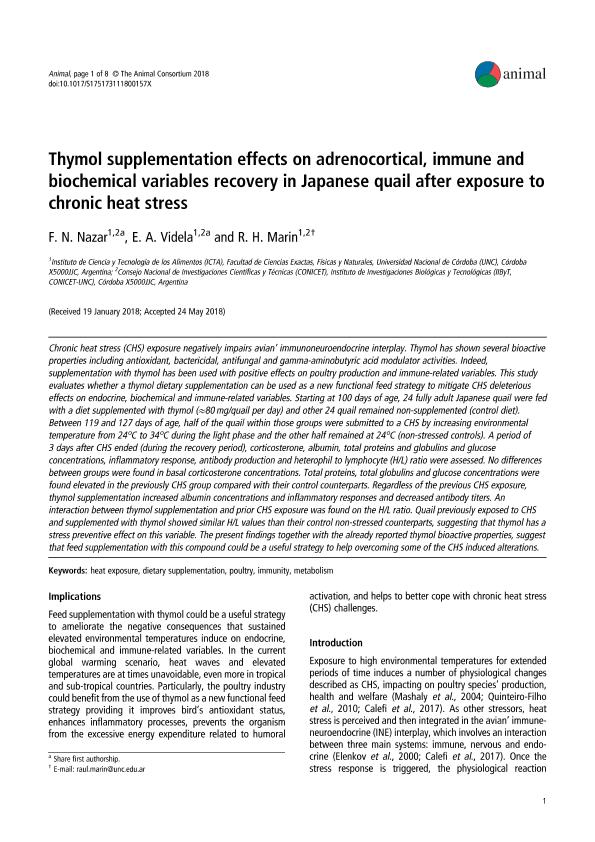Artículo
Thymol supplementation effects on adrenocortical, immune and biochemical variables recovery in Japanese quail after exposure to chronic heat stress
Fecha de publicación:
02/2019
Editorial:
Cambridge University Press
Revista:
Animal
ISSN:
1751-7311
e-ISSN:
1751-732X
Idioma:
Inglés
Tipo de recurso:
Artículo publicado
Clasificación temática:
Resumen
Chronic heat stress (CHS) exposure negatively impairs avian' immunoneuroendocrine interplay. Thymol has shown several bioactive properties including antioxidant, bactericidal, antifungal and gamma-aminobutyric acid modulator activities. Indeed, supplementation with thymol has been used with positive effects on poultry production and immune-related variables. This study evaluates whether a thymol dietary supplementation can be used as a new functional feed strategy to mitigate CHS deleterious effects on endocrine, biochemical and immune-related variables. Starting at 100 days of age, 24 fully adult Japanese quail were fed with a diet supplemented with thymol (≈80 mg/quail per day) and other 24 quail remained non-supplemented (control diet). Between 119 and 127 days of age, half of the quail within those groups were submitted to a CHS by increasing environmental temperature from 24°C to 34°C during the light phase and the other half remained at 24°C (non-stressed controls). A period of 3 days after CHS ended (during the recovery period), corticosterone, albumin, total proteins and globulins and glucose concentrations, inflammatory response, antibody production and heterophil to lymphocyte (H/L) ratio were assessed. No differences between groups were found in basal corticosterone concentrations. Total proteins, total globulins and glucose concentrations were found elevated in the previously CHS group compared with their control counterparts. Regardless of the previous CHS exposure, thymol supplementation increased albumin concentrations and inflammatory responses and decreased antibody titers. An interaction between thymol supplementation and prior CHS exposure was found on the H/L ratio. Quail previously exposed to CHS and supplemented with thymol showed similar H/L values than their control non-stressed counterparts, suggesting that thymol has a stress preventive effect on this variable. The present findings together with the already reported thymol bioactive properties, suggest that feed supplementation with this compound could be a useful strategy to help overcoming some of the CHS induced alterations.
Palabras clave:
DIETARY SUPPLEMENTATION
,
HEAT EXPOSURE
,
IMMUNITY
,
METABOLISM
,
POULTRY
Archivos asociados
Licencia
Identificadores
Colecciones
Articulos(IIBYT)
Articulos de INSTITUTO DE INVESTIGACIONES BIOLOGICAS Y TECNOLOGICAS
Articulos de INSTITUTO DE INVESTIGACIONES BIOLOGICAS Y TECNOLOGICAS
Citación
Nazar, Franco Nicolas; Videla, Emiliano Ariel; Marin, Raul Hector; Thymol supplementation effects on adrenocortical, immune and biochemical variables recovery in Japanese quail after exposure to chronic heat stress; Cambridge University Press; Animal; 13; 2; 2-2019; 318-325
Compartir
Altmétricas




